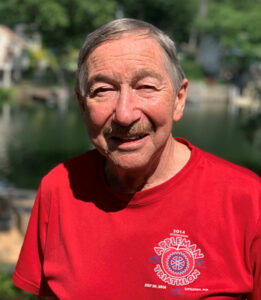New England pioneer in occupational medicine
By Jane Keller Gordon, Assistant Editor

Photo/ Jane Keller Gordon
Stow – Tom Winters spent much of his youth in Montana—climbing mountains, fly fishing, working on farms and in factories, and helping others. Winters, an Eagle Scout and excellent student, graduated from the University of North Dakota and the school’s medical program, which at the time included only the first two academic years of study. He then transferred to Tufts University School of Medicine to complete his last two clinical years.
Winters thought that he would return to Montana to practice family medicine in Kalispell, next to Glacier Park. He’s still here. Winters married his wife Lori 35 years ago, and they raised their son and daughter on Lake Boon in Stow. In New England, he became a pioneer in occupational medicine, focusing on the diagnosis and treatment of conditions resulting from workplace exposures and injuries.
An early understanding of the worker’s plight
In some ways, the groundwork for Winter’s professional path was set in Montana. During high school, college, and after college, Winters worked at the Anaconda Company.
“I saw people in dirty jobs, wearing dirty half-face masks refining zinc and copper in smelters. From an early age, I understood the worker’s plight that they were being exposed to chemicals, dust, metals, and fibers,” he said.
He also had an early appreciation of the dangers of the nuclear fuel cycle. During his time at the University of North Dakota, Winters led a protest against the construction of underground defense missile silos in a nearby town. In 1979, at the Pennsylvania Statehouse, he gave a keynote speech on the health effects of the Three Mile Island disaster. He protested against the Seabrook Nuclear Power Plant. He was on board of directors and executive committee for the Physicians’ for Social Responsibility, an affiliate of the International Physicians for the Prevention of Nuclear War. This organization won a Nobel Prize in 1985 for advocating against weapons and nuclear power plants.
Post medical school journey
After graduating from Tufts in 1973, Winters completed a residency in internal medicine and fellowship in infectious disease. He joined the teaching staff of the University of Massachusetts (UMass) Medical School, focusing on these subjects.
In the mid-1980s, Winters became interested in public health and occupational medicine. He studied both disciplines, and became a medical director of the Community Oriented Primary Care program at Carney Hospital in Dorchester.
“We identified a community-based problem, figured out how to fix it, and followed up. In Roxbury, that problem was an infestation of rats. When we were done, the rats were gone and so were the diseases that they brought,” said Winters.
Winters’ Occupational Medicine Clinic at Carney also dealt with foundry workers who experienced respiratory exposures and many employees who suffered musculoskeletal injuries.
While at Carney, Winters and his colleagues spoke with physicians about prescribing opioids for chronic pain.
“We saw patients who become addicted, their families were destroyed, and they never went back to work. We saved insurance companies billions by challenging these docs and saved lives,” said Winters.
At Carney, he also taught internal medicine residents and ran a large HIV practice starting in 1983. In 1990, Winters started admitting patients with occupationally related issues and teaching other physicians about occupational medicine. This led to a subsidized occupational and environmental residency rotation at the Harvard School of Public Health.
Expanding occupational health services and therapies
In 1990, Winters left Carney and became the medical director for the Caregroup Occupational Health Network, which provided occupational health services for a network of 12 occupational medicine clinics out of the New England Baptist Hospital and Beth Israel Deaconess. These clinics cared for hospital employees, as well as workers who became ill or injured in their workplace. Winters incorporated conservative therapies (chiropractic and physical therapy) as well as orthopedic specialists.
Winters and a partner established Occupational Environmental Health Network (OEHN) in 2006. OEHN now provides occupational health services at many hospitals, including UMass, Boston University, and Steward. It also supports researchers at many academic, pharmaceutical, and biotechnology companies in Massachusetts.
These days, Winters, now 72, continues his work in occupational health. In the summer he rides his mountain bike, does a few sprint triathlons, and climb area mountains. He’s training to get his sports flight license so he can fly his ultralight plane. In the winter, he skates and skis cross country and downhill.
On Dec. 5 of this year, the New England College of Environmental Medicine will award Winters the Harriett L. Hardy MD Award in recognition of his contributions to the field.












